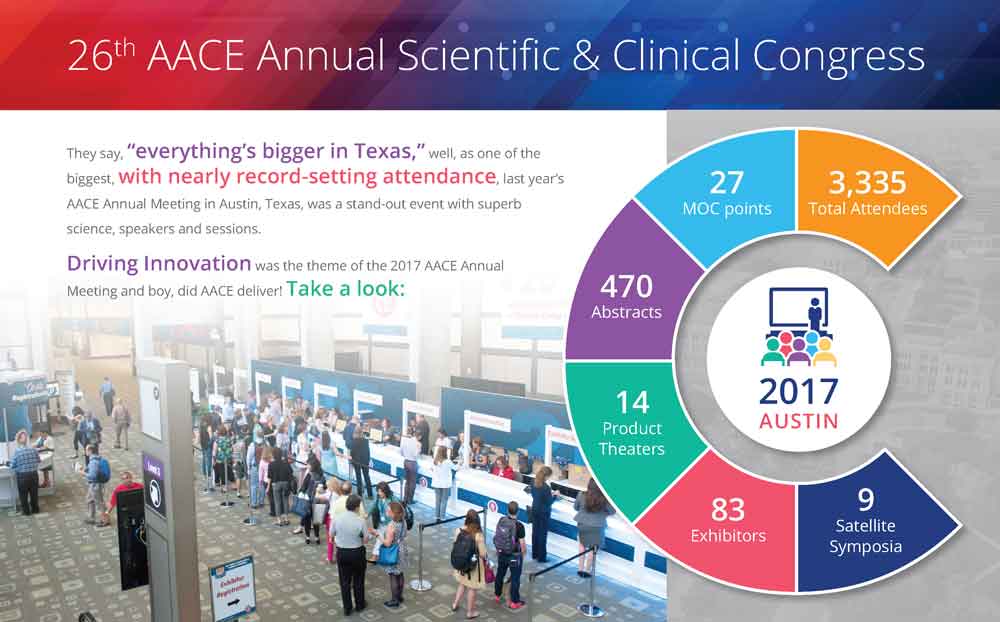The American Association of Clinical Endocrinologists is a professional community of physicians specializing in endocrinology, diabetes, and metabolism committed to enhancing the ability of its members to provide the highest quality of patient care.
AACE Annual Report 2017-2018
RUNTIME: 3:52During the 2017- 2018 Association year, AACE experienced and continues to experience a significant transformation both internally and externally.
Message from the President
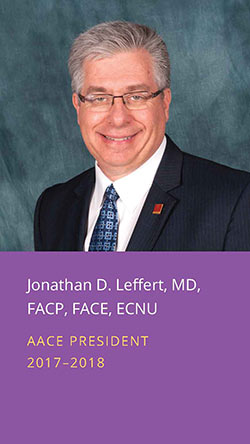 WHEN I REFLECT on my year as AACE President, the word that comes to my mind is transformation. Last year, AACE hired a new CEO, Paul Markowski, to succeed Don Jones who served as CEO for the past 20 years. Unfortunately, Don passed away in July – a transforming event for AACE and me. Don was a mentor to me for the past 15 years, and I have greatly missed his soft spoken gentlemanly presence and our personal friendship.
WHEN I REFLECT on my year as AACE President, the word that comes to my mind is transformation. Last year, AACE hired a new CEO, Paul Markowski, to succeed Don Jones who served as CEO for the past 20 years. Unfortunately, Don passed away in July – a transforming event for AACE and me. Don was a mentor to me for the past 15 years, and I have greatly missed his soft spoken gentlemanly presence and our personal friendship.
Although the mission-critical issues of advocacy and education are a constant, the health care environment continues to change at an increasingly rapid pace. During the 2017- 2018 Association year, AACE experienced and continues to experience a significant transformation both internally and externally. Soon after the very successful 2017 Annual Meeting, Mother Nature brought massive destruction to Houston, Florida and the Caribbean. AACE members and staff mobilized to provide important “boots on the ground” service with our involvement in the Diabetes Emergency Relief Coalition, a group of eight organizations that provided diabetes supplies to patients affected by these disasters.
At the same time, a membership survey revealed to the AACE executive leadership the needs and desires of the membership. Our response was the beginning of the transformation of AACE in many different areas.
Internally, the transformation at AACE started with realignment of staff and investment in infrastructure. The goal of our Digital Strategy portfolio is to improve communications, and to provide the membership an enhanced experience for our educational offerings. Over the next few years, you will see the fruits of this investment.
Transformation will also be occurring in the governance of AACE over the next few years. The AACE Board of Directors has just completed a nearly yearlong reflection on its structure and function. The result is a recommended restructure of the Boards of both AACE and the American College of Endocrinology (ACE), into near identical governing bodies, eliminating the often confusing dual leadership structure. The purpose of this change is to function more strategically and focus our efforts on our mission-specific goals of education and advocacy. This transition will take place over the next few years, making sure that our institutional memory remains. In addition, this transformation will require a Bylaws change and membership will have the opportunity to vote at this year’s Business Meeting held during the Annual Meeting in May.
Another internal transformation to enhance our organizational function is a new committee structure. Throughout the years, members were called upon to serve on one or more committees at a time. Recognizing the huge time commitment required of some to adequately cover the committee charges, we have streamlined the committee structures into new Disease State Networks.
We will continue to have operations committees such as Legislative and Regulatory, Practice Management, Chapters and Membership Committees. The Disease State Networks (see Page 42) will function under the direction of the Education and Clinical Practice Guidelines Oversight Committees.
I am grateful to all the dedicated members who have served on AACE committees this year. Their expertise and diverse knowledge helped to improve best practices that impact health outcomes for our patients. Please see a complete list of those who served at the link below.
2018 Presidents Report Honor Roll
I have enjoyed the last year immensely and appreciate your confidence and support of my efforts as your President. I will be forever indebted to my wife Carla, and my daughters, Caroline and Catherine, who are always there to support and encourage me. The staff at AACE are a talented, motivated and dedicated group and our organization is under excellent leadership with Paul Markowski as our CEO. They have been excellent partners in transforming AACE over the last year.
Respectfully,

Jonathan D. Leffert, MD, FACP, FACE, ECNU
The American Association of Clinical Endocrinologists is a professional community of physicians specializing in endocrinology, diabetes, and metabolism committed to enhancing the ability of its members to provide the highest quality of patient care.
The AACE Community

An engaged, community-like, satisfied and active membership is the nucleus of any organization, and that is especially true of AACE members.
AACE Membership*
- 7,803 Total members
- 5,609 (72%) Domestic members
- 2,194 (28%) International members in 99 countries
*AS OF PUBLICATION APRIL 2018

Who Are We? A Look at Member Demographics
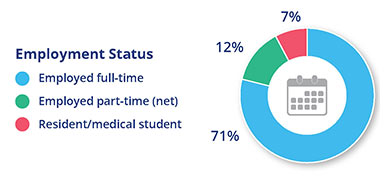
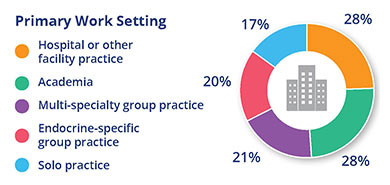
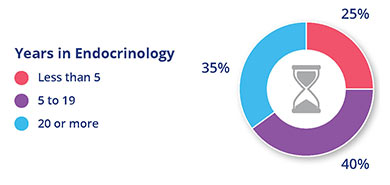
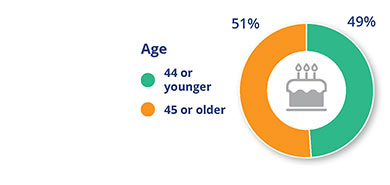

Throughout 2017 and 2018, the Membership Committee worked on several member-focused initiatives, especially geared to Fellows-in-Training and Young Physicians including:
- Provided assistance to young physicians and others new to endocrinology with incentives such as extending the dues reduction from one-year to the first three years after fellowship graduation, and dedicated sessions just for young physicians during the AACE Annual Meeting, accompanied by a networking event.
- Encouraged special programming efforts at the Chapter level for fellows-in-training (FIT), including the opportunity for FITs to promote their latest work through abstract contests and poster sessions, introductory group career sessions, one-on-one career counseling, FIT case presentations, educational reimbursement, plus, the opportunity to have a Board of Directors position on the Chapter level.
- Participation in the Joint Liaison Committee of the Association of Program Directors in Endocrinology, Diabetes and Metabolism (APDEM), which works to serve and support training programs in endocrinology to help prepare fellows, residents, and medical students for clinical practice and research in endocrinology. Several initiatives are being planned including:
- A webinar for fellows about careers in endocrinology
- A “career survival” session and dedicated networking time for young physicians and fellows-in-training during the Annual Meeting
- Working in conjunction with the FIT/Membership Committees to involve potential mentors, and more.
Your Local AACE Connection
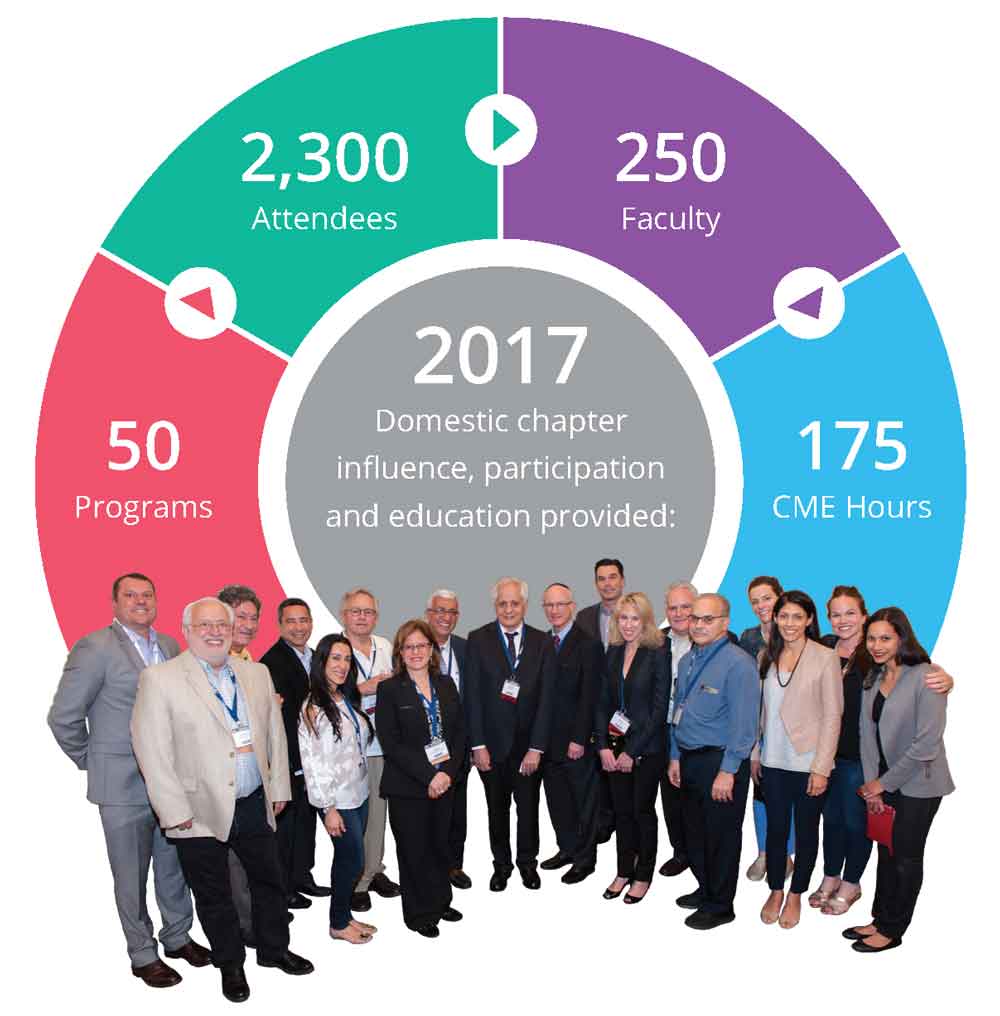
Chapters - AACE Community Partners
AACE state and regional chapters are the community-level voices of AACE members. The 22 active domestic AACE chapters and 16 international AACE chapters play a strong role in the education and development of clinical endocrinologists around the world. Chapter programs include annual meetings, dinner programs, journal clubs, fellow education, and primary care activities.
Many domestic AACE chapters have formed legislative and practice management committees to better integrate activities, coordinate efforts and improve communications between national and local AACE members, as well as to strengthen AACE's grassroots advocacy for legislative issues and congressional candidate support. Right: Members of the New York Chapter
Throughout 2017, domestic chapter influence, participation and education provided:
- more than 2,500 healthcare professionals with AACE educational opportunities offerings at the chapter level
- Collectively, held more than 50 programs facilitated by more than 250 faculty, including nearly 175 CME hours
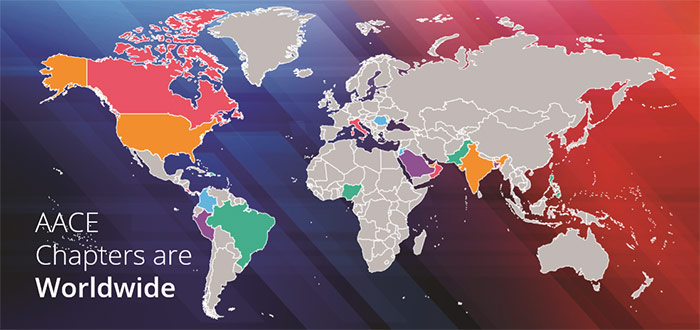
AACE chapters can be found:
-
Domestic: Arizona, California, Carolinas (NC, SC), Florida, Georgia, Heartland (AR, KS, MO, NE, OK), Illinois, Michigan, Mid-Atlantic (DC, DE, MD, VA), Minnesota/Midwest (IA, MN, ND, SD, WI), Nevada, New England (CT, MA, ME, NH, RI, VT), New Jersey, New Mexico, New York – Lower, New York – Upper, Ohio River Regional (IN, KY, OH, PA), Pacific Northwest (AK, HI, ID, MT, OR, WA, WY), Puerto Rico, Southern States (AL, LA, MS, TN), Texas and West Virginia.
-
International: Bangladesh, Brazil, Canada, Colombia, Costa Rica, Dominican Republic, Gulf (Bahrain, Kuwait, Oman, Qatar, Saudi Arabia, and United Arab Emirates), India, Italy, Jordan, Lebanon, Nigeria, Pakistan, Peru, Philippines and Romania.
Advocating for You
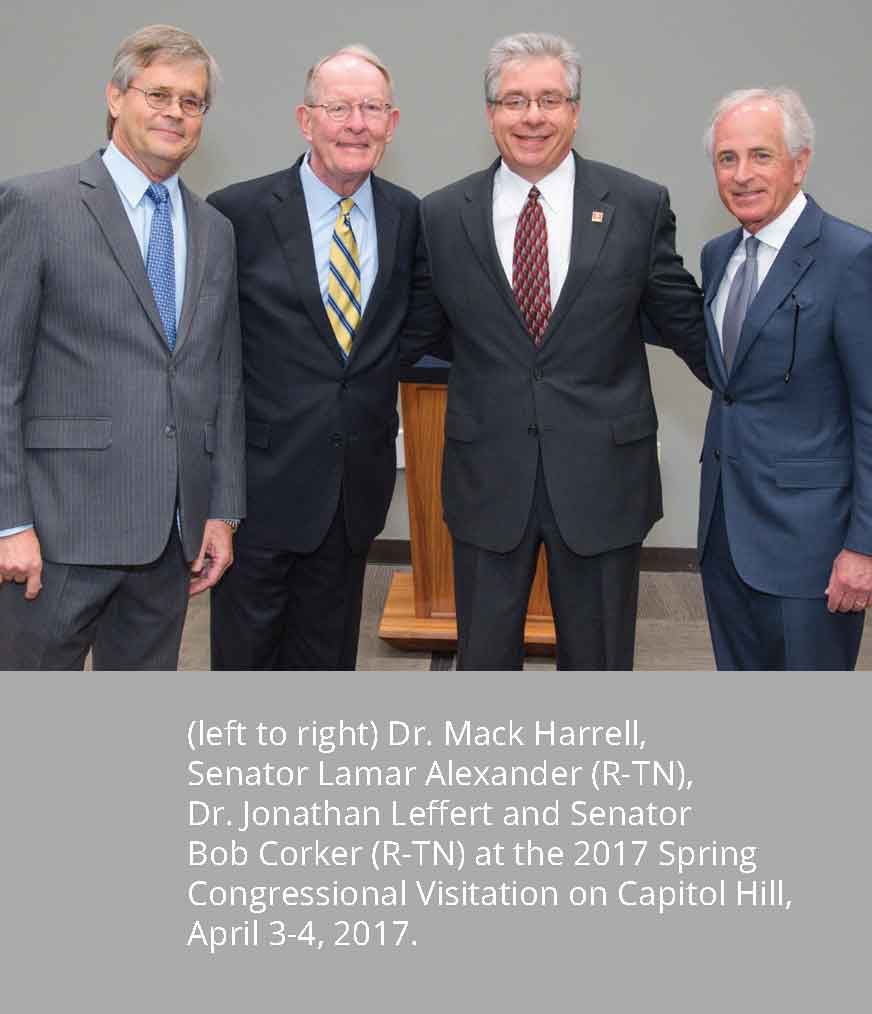
AACE Legislative & Governmental Affairs
The AACE Legislation and Regulatory Committee works to help advance the practice of endocrinology, and influence public opinion and policy on behalf of endocrinologists and their patients. The Committee had several legislative priorities this past Association year.<
As AACE’s signature diabetes legislation, the Commission will evaluate current federal diabetes programs to ensure they are meeting the goal of improving the quality of patient care. And, as part of this process, the Commission will focus on recommendations to improve the translation of basic science and translational areas of diabetes programs in the federal government into clinical practice and work with agencies to better coordinate efforts so patients are able to benefit from the newest diabetes-related technology and innovations.

6 years: It took a culmination of six years of relentless work by AACE advocates and others from the diabetes community as well as congressional sponsors to get The National Clinical Care Commission Act passed by Congress on October 11, 2017 and signed into law on November 2, 2017.
Advocacy Achievements
AACE advocacy helped facilitate the following achievements that were also signed into law in early 2018 as part of the Bipartisan Budget Act of 2018:
Protecting Access to Diabetes Testing Supplies Act
Legislation that seeks to enhance patient protections under the Medicare Competitive Bidding Program to ensure access to a range of safe and effective meters and compatible testing supplies.
Repeal of the Independent Payment Advisory Board (IPAB)
This 15-member advisory board appointed by the U.S. President, would be responsible for cutting Medicare spending if projected to exceed the target growth rate. If triggered, this unelected Board created under the Affordable Care Act, essentially removed important Medicare policy decisions from Congress by eliminating the transparency of hearings, debate and opportunity for stakeholder input.
Technical Corrections to the Medicare Access and CHIP Reauthorization Act (MACRA)
Provides CMS flexibility in the implementation of the MACRA law to help physicians transition to the new Quality Payment Program.
Reauthorization of the Federal Special Diabetes Programs
The Special Diabetes Program for Type 1 Diabetes and the Special Diabetes Program for American Indians was reauthorized for two years. These programs conduct critical research towards a cure for type 1 diabetes and provide diabetes education and treatment for American Indians and Alaska natives.
Additional Advocacy Activities
AACE continues to advocate for congressional passage of bills pending before Congress that will provide the following:
- A sustainable Medicare payment rate for DXA bone density scans and,
- Medicare beneficiaries and their physicians with meaningful tools to reduce obesity by improving patient access to weight-loss counseling and by allowing Medicare coverage for new FDA-approved prescription drugs for chronic weight management.
Working to Modify, Improve and Ensure
AACE is working with federal agencies to modify regulations to broaden access and coverage for insulin pumps; improve the Medicare Competitive Bidding Program to ensure the accuracy and safety of diabetes technologies and supplies, and provide comments on proposed payment policies under the Medicare Physician Fee Schedule and the Medicare Access and CHIP Reauthorization Act (MACRA).
Congressional Visits
32: AACE physician members participated in the 2017 Spring Congressional Visitation, April 3–4, 2017. The members conducted a combined 110 congressional meetings, with the main purpose of advocating for final passage of the National Clinical Care Commission Act.
Serving the Underserved
Helping to eliminate the continued existence of endocrine disparities in the U.S., AACE devotes several resources to diminish these disparities, particularly in minority populations. One of the many charges of the AACE Underserved Populations Committee (the Public Impact Committee beginning May 2018) is to help member physicians understand the varied health beliefs, behaviors and needs – based on racial, ethnic, religious or social norms – of their patients.
Resources available to both members and their patients can be found on the Cultural Competency and Health Care Disparities Resources webpage at: www.aace.com/resources/cultural-competency-and-minority-health
Practice Management Advocacy
The Practice Management and Advocacy Committee, formerly known as the Socioeconomics Committee works with federal regulators and insurance companies to ensure that AACE members have a voice in how they are compensated and reimbursed.
In 2017, the Committee developed a White Paper on AACE Principles of Prior Authorization for Medications 2018, that informs members of AACE’s efforts to decrease the burden-laden red-tape many of them face as they pursue better patient outcomes.
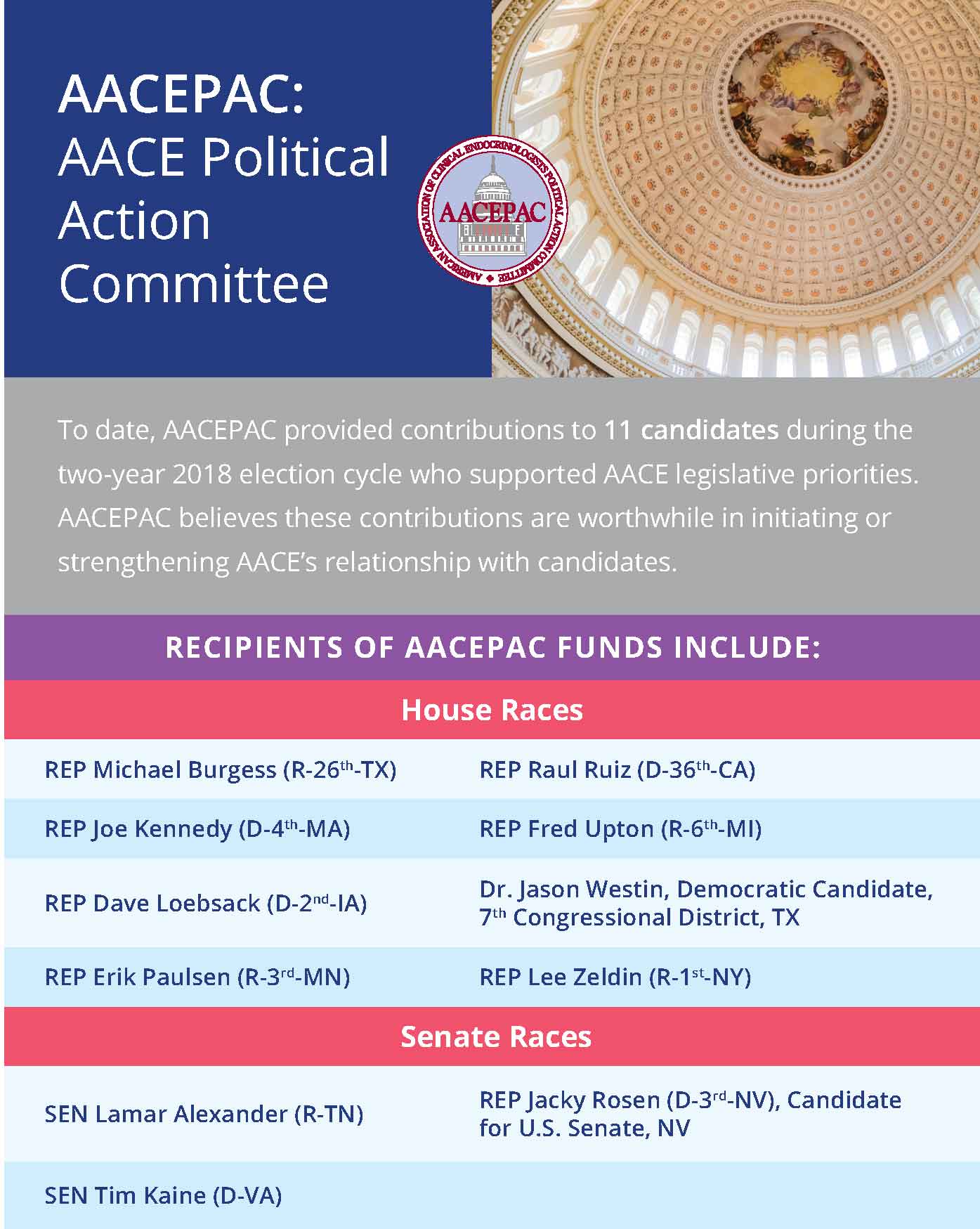
In addition, the Committee developed:
- An In-Depth Symposium for the 2018 Annual Meeting
- Continuous Glucose Monitoring (personal and professional) codes were approved by the Current Procedural Terminology (CPT) and the Relative-Value Scale Update Committee (RUC).
Payment Model Subcommittee
As a subcommittee of the Practice Management Support Committee, the charge of this committee is to develop educational tools and resources to guide members in understanding the 2015 MACRA law and its transformation to the physician reimbursement system, including the Merit-Based Incentive Payment System (MIPS) and Advanced Alternative Payment Models (APMs).
Commercial Insurance Task Force
This task force is set up to work with insurance companies on behalf of endocrinologists. This past year, the task force worked with UnitedHealthcare to help accomplish several initiatives. Similar negotiations have begun with the Blue Cross Blue Shield Association as well. Some of the accomplishments include:
- Decrease the need for prior authorizations for endocrine tests
- Selection of an AACE endocrinologist to serve on UnitedHealthcare’s Pharmacy and Therapeutics Committee
- Continuing the discussion about a reimbursement program based on AACE’s Diabetes APM
Advocacy on Behalf of Patients
Last year, AACE teamed up with the Endocrine Society (ES) to address the high cost of insulin and the associated burdens placed on millions of Americans who rely on costly, daily insulin injections.
In addition, AACE collaborated with the American Diabetes Association (ADA), the Association of Diabetes Care & Education Specialists (ADCES), and the Endocrine Society, to issue a statement of disagreement in regard to the American College of Physicians’ (ACP) proposed new guidance that suggests higher blood glucose targets for people with type 2 diabetes. In consensus, we believe the ACP recommendation of blood glucose targets for A1C from 7 to 8 percent could prevent many patients from receiving the full benefits of long-term glucose control.
The proposed ACP guidance prompted AACE and the others to respond immediately on behalf of the more than 29 million Americans with type 2 diabetes.
Once more, it was AACE and the ES who introduced a resolution at the Interim Meeting of the AMA House of Delegates, that called on the AMA to pursue several initiatives aimed at improving insulin affordability for patients with diabetes. Overwhelming support for addressing insulin costs and their impact on patients expressed on the floor of the House of Delegates led to a unanimous vote for the AMA to study these issues and provide a report with findings and recommendations to the House of Delegates at the AMA 2018 Annual Meeting in June.

Diabetes Emergency Relief Coalition
As the nation watched in horror the effects of Hurricanes Harvey, Irma and Maria on Houston, Florida and Puerto Rico, AACE joined like-minded organizations including the American Diabetes Association (ADA), JDRF, Association of Diabetes Care & Education Specialists (ADCES) and others, in coalescing to provide support to patients with diabetes, especially in dire circumstances.
Health Care in a Transcultural America
Understanding the varying cultural attributes of an ever-global America, AACE’s Center for Transcultural Endocrinology (ACTE), coordinated a series of one-day symposia for physicians held in three diverse U.S. cities in 2017: Houston, Miami, and New York City.
Known as Diabetes Care Across America – A Series of Transcultural Summits, these three non-CME summits identified that patient characteristics such as age, gender, height, and weight, among others, play a significant role in developing health treatment plans. The sessions included information on the varying cultural attributes of the host cities, creating a “transcultural” approach to diabetes care in patients from different ethnicities, religions, and cultures.
Public Relations Oversight and Rapid Response Committee
Charged with updating or creating new content and landing pages for AACE/ACE’s primary patient education website, www.empoweryourhealth.org, 11 endocrine disease state categories and related sub-categories were featured on the landing pages with working groups of committee members submitting updates for eight of those endocrine disease states.
Prescriptionhelp.aace.com
One of AACE’s newest patient programs, Prescriptionhelp.AACE.com, launched in August 2017. This online service helps patients locate programs that provide assistance for out-of-pocket costs for endocrine disease-related prescription medications and supplies.
To date, 5,000 visitors sought more information/assistance from Prescriptionhelp.AACE.com and the website (at the time of printing) had 8,700 page views.

Developing Resources for Patient Care
Publications and Courses
Clinical Practice Guidelines (CPGs) and Treatment Algorithms
Known as the “gold standard,” AACE’s Clinical Practice Guidelines (CPGs) are developed to assist health care professionals in medical decision making for specific clinical conditions. Typically, the guidelines are developed by members of an AACE scientific committee or task force and published in AACE’s scientific journal, Endocrine Practice.
AACE Treatment Algorithms have been developed for several endocrine diseases and serve as a quick reference to CPGs.

Endocrine Practice

As a robust and scientifically influential medical journal, AACE’s Endocrine Practice (EP), is a monthly, peer-reviewed journal available to endocrinologists and other physicians and health care professionals, to enhance the health care of patients with endocrine diseases through continuing education of practicing endocrinologists. Each month, EP contains information about the latest clinical endocrinology findings, research, and treatments.
2.35*: The 2016 Impact Factor for Endocrine Practice, which is the average number of citations received per manuscript published in the journal during 2014 and 2015.
Endocrine Practice by the Numbers for 2017:
- 486: Manuscripts submitted
- 202: Manuscripts published
- 1,512: Editorial pages published
- 181,141: Article downloads
Top Article Downloaded:
American Association of Clinical Endocrinologists, American College of Endocrinology, and Androgen Excess and PCOS Society Disease State Clinical Review: Guide to the Best Practices in the Evaluation and Treatment of Polycystic Ovary Syndrome by Neil F. Goodman, Rhoda H. Cobin, Walter Futterweit, Jennifer S. Glueck, Richard S. Legro, Enrico Carmina. Number of views: 14,055.
 AACE Clinical Case Reports
AACE Clinical Case Reports
Published quarterly, AACE Clinical Case Reports (ACCR) is a peer-reviewed, online-only medical journal dedicated to case reports. Each issue features select case reports and commentary from noted endocrinology experts.
AACE Clinical Case Reports was recently accepted for inclusion in PubMed Central (PMC).
AACE Clinical Case Reports by the Numbers for 2017:
- 162: Manuscripts submitted
- 92: Manuscripts published
- 416: Editorial pages published
- 57,417: Article downloads
Top Article Downloaded:
When are HBA1C Values Misleading? by Dr. Richard Hellman. Number of views: 4,328.
 Top Downloaded Manuscripts in 2017
Top Downloaded Manuscripts in 2017
The following AACE/ACE White Papers (Clinical Practice Guidelines, Position Statements, Consensus Statements, Clinical Reviews) were developed and published by AACE’s Disease State Scientific Committees and/or Task Forces in 2017.
These papers were among the top downloaded manuscripts from the AACE Journals website for the year.
- 14,340 – AACE/ACE 2017 Comprehensive Diabetes Management algorithm
- 10,229 – The ABCDs of Obesity -- Presenting A New Diagnostic Term: An AACE/ACE Position Statement on Adiposity-Based Chronic Disease
- 9,995 – AACE/ACE Guidelines for Clinical Practice for Dyslipidemia - 2017 Update
- 9,878 – AACE/ACE Position Statement on Menopause - 2017 Update
Published Consensus, Position Statements, White Papers and Guidelines in 2017-2018
- AACE/ACE Position Statement on the Use of Follow-On Biologics and Biosimilars for Endocrine Disease
- Dysglycemia-Based Chronic Disease: An AACE/ACE Position Statement
- AACE/ACE Position Statement on Integration of Insulin Pumps and Continuous Glucose Monitoring in Patients with Diabetes Mellitus
- 2018 AACE/ACE Comprehensive Diabetes Management Algorithm and Executive Summary
- AACE/ACE Position Statement on Menopause
- Adiposity-Based Chronic Disease as a New Diagnostic Term: AACE/ACE Position Statement
- AACE/ACE Guidelines for Management of Dyslipidemia and Prevention of Cardiovascular Disease
- AACE/ACE Protocol for Standardized Production of Clinical Practice Guidelines, Algorithms, and Checklists
- Consensus Statement by AACE/ACE on DXA Writing Committee on the Quality of DXA Scans and Reports
- The Use of Vitamins & Minerals in Skeletal Health Position Statement A white paper submitted to Endocrine Practice for peer review and publication.
- AACE/ACE Position Statement on Patient Access to Necessary and Appropriate Medical Care
- 2017 American Association of Clinical Endocrinologists/Endocrine Society Update on Transgender Medicine: Case Discussions
Task Force on the Endocrinology of Aging
Clinical review articles published in the September 2017 issue of Endocrine Practice:
- The Endocrinology of Aging
- Thyroid Nodules in the Elderly
- Gliding Through the Golden Years Gracefully
- Aging and Falls
- Sarcopenia
Resource Centers
DIABETES: Since its debut in 2013, the Diabetes Resource Center (DRC) has received 64,515 combined visitors, with more than 100,000 unique page views, and 18,000+ unique downloads in 2017.
OBESITY: The AACE Obesity Resource Center (ORC) was launched in 2016, and is a compendium of educational tools to help AACE members and other health care professionals stay on top of the rapidly evolving landscape of obesity science and pharmacotherapy, as well as complications-centric strategies to assist in improved long-term maintenance of weight loss in patients with obesity.
This ORC allows AACE members to take the lead in implementation of obesity practice guidelines and assists other members of their healthcare team in the formulation and delivery of education and guidelines with the goal of improving care of patients in their communities.
In 2017, the ORC website had 5,663 visitors, with more than 19,000 unique page views, and 14,000+ unique downloads.

Diabetes Days
As the latest national figures indicate, diabetes diagnosis is on the rise. With that in mind, in 2008, AACE created Diabetes Days for Primary Care Physicians. These accredited, half-day educational events are held throughout the year for the benefit of primary care physicians (PCPs) and other health care professionals. The program includes information on the latest updates in diabetes care and treatment, as well as utilizing AACE algorithms and guidelines. Many AACE Chapter leaders serve as faculty for the events held throughout the year.
During December 2016 through November 2107, 16 Diabetes Days programs were held for nearly 2,000 PCPs and other healthcare professionals.
Endocrinology Annual Board Review Course Committee
165: Physicians, fellows, and other allied health professionals attended the 20th Annual Intensive Review of Endocrinology and Metabolism Course co-provided by AACE/ACE and the Cleveland Clinic Department of Endocrinology, Diabetes and Metabolism in October 2017. The Board Review Course was accredited by the Cleveland Clinic Foundation (CCF) for AMA PRA Category 1 Credit(s)™.
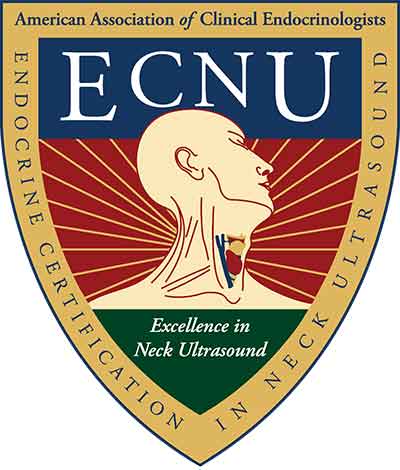 ECNU Certification Committee
ECNU Certification Committee
Ensuring direct oversight of and developing strategies and components for AACE Endocrine Certification in Neck Ultrasound (ECNU), this year alone:
- 60 - Physicians applied for ECNU Certification during the Spring and Fall 2017 application periods.
- 53 - Physicians passed Step 1 of the certification process with its Comprehensive Certification Test, which allows progression to Step 2, including submitting 15 specific cases for peer review.
- 541 - Physicians have completed the ECNU process and earned the ECNU credential as of February 15, 2018.
Continuing Medical Education (CME)
In 2017, CME activities served to maintain, develop and increase the skills and knowledge of endocrinologists to enhance patient care. Several activities focused on helping AACE members achieve CME through live educational events and courses, online programs and through publications.
CME by the Numbers in 2017:
- 510 - CME hours offered
- 10,050 - Physician participants
- 7,676 - Non-physician participants
- 67 - Total CME activities
Endocrine Fellow Travel Grant
For three years, the Endocrine Fellow Travel Grant Program has offered domestic fellows-in-training a unique educational opportunity – to experience a two-to four-week clinical extramural rotation of their choice either in the U.S. or abroad. Since its inception in 2015, $30,000 has been awarded to six travel grant recipients. Both of the 2017 recipients will complete their extramural rotation in summer 2018.
In 2017, two Endocrine Fellow Travel Grants were awarded:
- Dr. Anish Gupta received $4,000 to assist and observe difficult patient cases pertaining to obesity at the Wellness Center of University of Colorado in Denver.
- Dr. Sean Iwamoto received $6,000 to study and observe different perspectives from the European network for the investigation of gender incongruence (ENIGI).

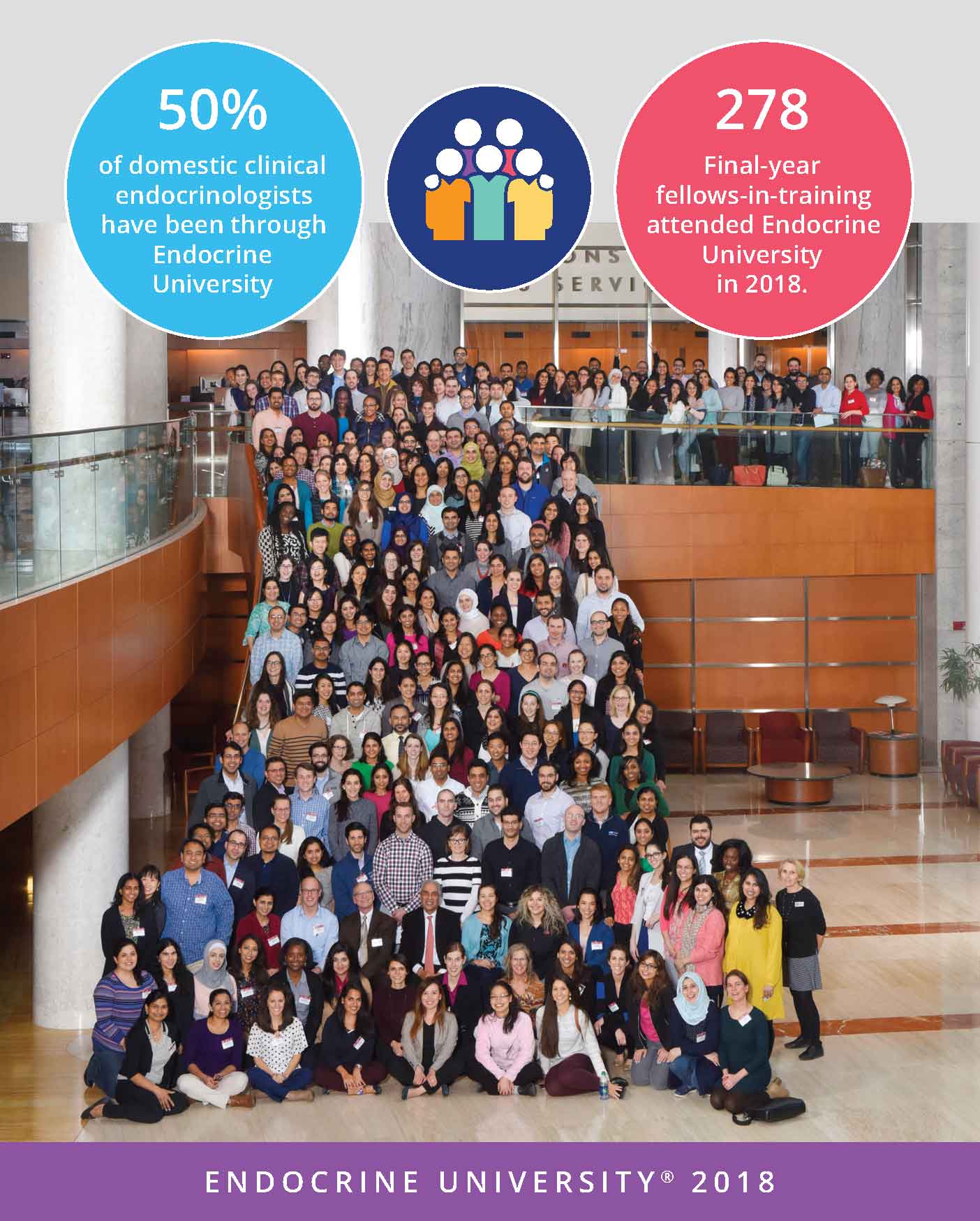
Endocrine University is one of AACE's signature educational events for final-year endocrine fellows-in-training. Since 2002, more than 4,000 endocrine fellows, representing more than 134 programs across the country, have attended the weeklong intense review of endocrine disease management held in Rochester, Minnesota.
The curriculum is specially designed to help prepare these fellows for entering clinical practice.
Key areas of clinical endocrinology include:
- Endocrine Neck Ultrasound and UGFNA, Thyroid Cancer
- Metabolic Bone Disease and Osteoporosis Management
- Endocrine Laboratory and Genetic Testing
- Obesity and Nutrition
- Lipids
- Diabetes Module and Hands-on Instruction
- Practice Management and Leadership
- Roundtables and Mini Grand Rounds
Supporting the Business Side of Your Practice
It’s all in the chart! AACE’s Practice Management provides assistance to help your endocrine practice stay on-par and compliant with state, federal and commercial requirements and regulations, especially when it comes to medical coding, documentation, billing, reimbursements and other essential business processes.
Accurate coding and documentation helps to ensure your practice receives proper reimbursement for services provided.
AACE offers several practice management courses, including live webinars as well as on-site personalized training sessions throughout the year to AACE member physicians and their staff, as well as non-physicians.
Some of the courses offered throughout the year include:
- AACE-sponsored Coding Courses – Two-day events held in various locations;
- Certificate of Endocrine Coding (CEC) Certification;
- Hosted Coding Courses – Courses requested by a physician or a group of physicians to benefit their staff;
- Personalized, On-site Training – An AACE representative will conduct on-site training session for staff;
- Live Webinars – Hosted by AACE, Practice Management Institute (PMI), and Liles Parker Law Firm these live courses include information on quality measures and reporting; financial incentives and penalties with MACRA; maximizing patient satisfaction and engagement, and more;
- On-Demand Services – Along with the AACE Practice Management staff via calls with questions on practice support, resources, HIPPA laws, and Medicare information, the Liles Parker Law Firm, AACE’s preferred compliance and legal partner, provides legal services and guidance on compliance matters;
- Consulting Services – AACE’s Practice Management offers on-demand consulting services in all areas of practice management, billing/coding, documentation, reimbursement, and MACRA/QPP, to external clients, industry partners, and non-member health care professionals.
Endocrine Toolkit for Success
The Endocrine Toolkit for Success is designed to assist AACE members and their staff with routine practice activities. The toolkit includes information on ICD-10, offers the latest news tips on participating in Medicare quality reporting programs, and ways to help you stay compliant with personal patient information reported under the Physician Sunshine Act – everything you need to be successful in today’s health care environment.
Scientific Committees and Task Forces
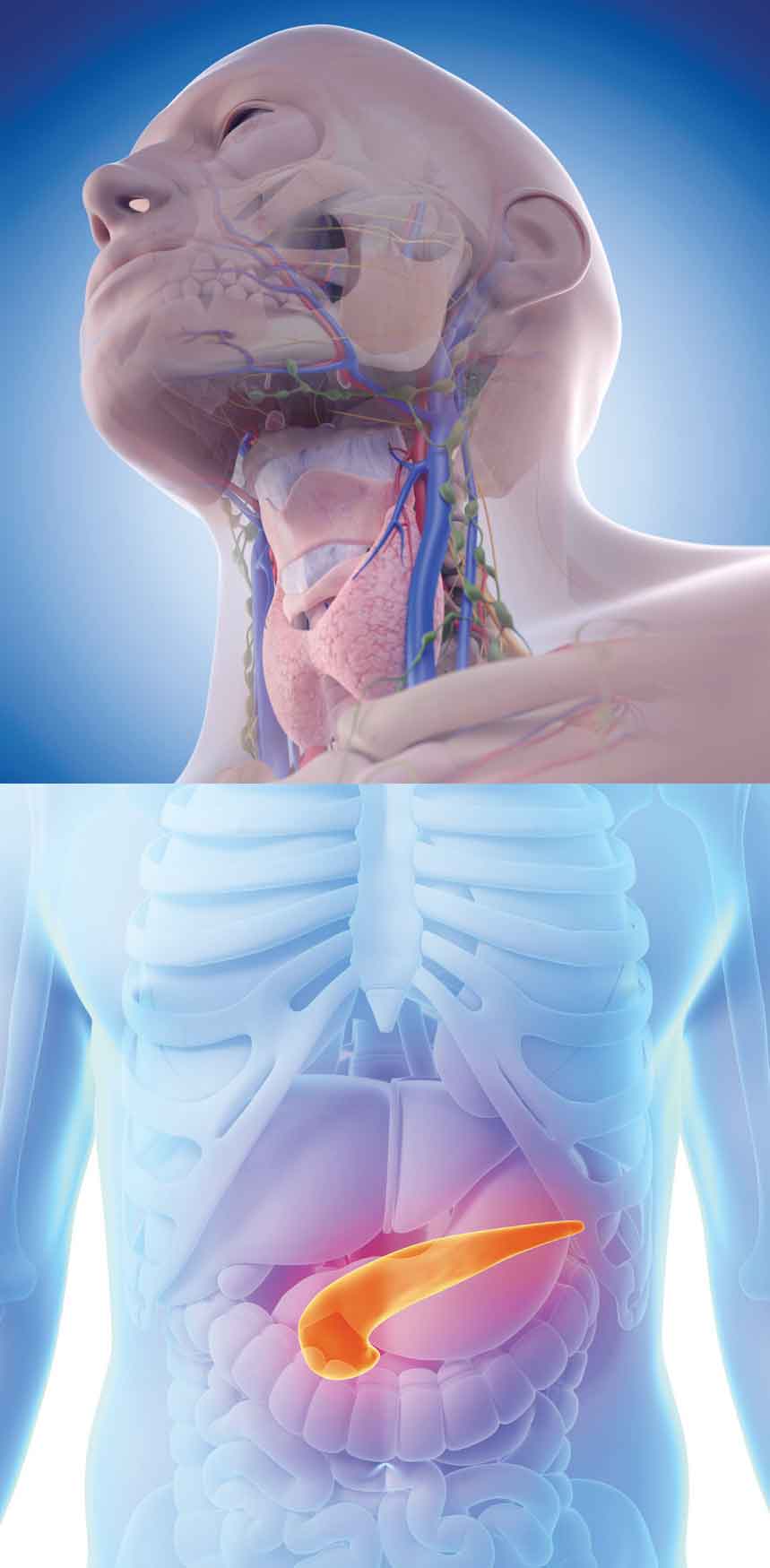
Throughout the years, AACE committees have led the development, implementation and promotion of academic excellence with scientific guidelines, algorithms, white papers, and consensus and position statements. Members of these committees represent various scientific disciplines in their areas of expertise.
Take a look at some of the work produced by AACE Committees and Task Forces:
ACE Scientific Referencing Team (ASRT)
ASRT completed the update for the AACE/ACE Protocol for Standardized Production of Clinical Practice Guidelines, Algorithms, and Checklists for 2017, including an updated system for determining evidence levels and grades, which was published in the August 2017 issue of Endocrine Practice.
AACE/ACE Bariatric Surgery Clinical Practice Guidelines - Task Force
AACE continues to collaborate with other like-minded organizations involved in obesity medicine, including the American Society for Metabolic and Bariatric Surgery (ASMBS), The Obesity Society (TOS), the American Society of Anesthesiologists (ASA), and the Obesity Medicine Association (OMA), to provide an update to the 2013 AACE/ACE Clinical Practice Guidelines for the Perioperative Nutritional, Metabolic, and Nonsurgical Support of the Bariatric Patient: cosponsored by AACE, TOS, and ASMBS.
No.1 The Bariatric Surgery Guidelines are the first to be developed with the new ASRT oversight and the first to adhere to the new Guidelines for Guidelines published in the August 2017 issue of Endocrine Practice.
AACE/ACE Postmenopausal Osteoporosis Clinical Practice Guidelines - Task Force
The 2018 update to the 2016 AACE/ACE Postmenopausal Osteoporosis Guidelines is being developed and will include clarification of fracture risk with sample cases, anabolic therapy’s role in osteoporosis management, denosumab—approaches to long-term therapy, and updates on duration of bisphosphonate therapy/rare adverse events and other updates on vitamin D therapy.
AACE/ACE Growth Hormone Clinical Practice Guidelines - Task Force
Progress is being made on updating the Growth Hormone Guidelines, focusing on the following sections: diagnosis based on new information available; transition patients; growth hormone assays; long-acting growth hormone formulations; and unapproved uses of growth hormone (sports and aging).
First drafts of each section are being reviewed by assigned reviewers within the Task Force and will be assembled into a full manuscript with references.
AACE's Position on the Integration of Insulin Pumps & Continuous Glucose Monitoring - Task Force
An AACE/ACE Position Statement titled Integration of Insulin Pumps and Continuous Glucose Monitoring in Patients with Diabetes Mellitus was published in the March 2018 issue of Endocrine Practice.
Comprehensive Diabetes Management Algorithm - Task Force
During 2017, the task force completed work on the 2018 AACE/ACE Comprehensive Diabetes Management Algorithm and Executive Summary, and they were published in the January 2018 issue of Endocrine Practice.
Proposed Thyroid Nodules Guidelines Update - Task Force
The Task Force is focusing on the development of an app, which will form the basis for the 2018 question-based guidelines. Additional topics that may be added for the 2018 guidelines update include:
- Surgery
- Health Options
- Active Non-surgery
- Molecular Biology
- Health Economics tool
Bone Scientific Committee
To complement AACE’s other two resource centers – Obesity and Diabetes – development of the Bone Resource Center (BRC) began in 2017, with Committee members submitting topics and slides. In addition, AACE responded to the release of the American College of Physicians (ACP) guidelines on osteoporosis.
Diabetes Scientific Committee
One of the many AACE scientific committees working on behalf of endocrinologists, the Diabetes Scientific Committee has provided support for:
- Educational program development and grant requests for diabetes-related education
- Responses to health insurance companies on coverage of appropriate therapies
- A position statement on the use of follow-on biologics and biosimilars for endocrine diseases
- The Comprehensive Type 2 Diabetes Management Algorithm
- The 2018 Position Statement on Integration of Insulin Pumps and Continuous Glucose Monitoring in Patients with Diabetes Mellitus
- Development of a web-based physician educational initiative, “The Right Combination” using AACE faculty-created case studies involving insulin/GLP-1 combination therapy that were presented in a multi-media format in English and Spanish in spring 2018.
In addition, AACE has been working in collaboration with Deontics, eClinical Works (eCW) and the multi-specialty ACO Amarillo Medical Specialists, run by AACE member Williams Biggs, MD, on a proof-of-concept pilot that integrates the AACE Diabetes Guidelines & Algorithm into the eCW user interface via a Deontics developed clinical decision support tool.
Endocrine Surgery Scientific Committee
The Committee’s main focus is to provide surgical expertise as it pertains to endocrine disorders – thyroid, parathyroid, adrenal, obesity, and others.
Last year, the Committee's initiatives included:
- The option of creating an endocrine surgery database registry to encompass both national and international initiatives
- Developing Adrenal Guidelines
- Blending the endocrine surgery committee and the obesity scientific committee expertise
- Utilizing the FACE designation to help recruit more endocrine surgeons to join AACE
Lipids Scientific Committee
Charges of the Lipids Scientific Committee include: to provide expertise in lipidology as it relates to diabetes, prediabetes and other cardiometabolic conditions.
This past year, members of the Lipids Scientific Committee began work on the following initiatives:
- Development of an app based on the lipids algorithm based on the 2017 Lipids Guidelines.
- 10,000 Pocket cards to be printed based on the guidelines.
- The “I am the Face of CVD Risk” video case studies featuring patients at varying levels of risks for cardiovascular disease.
- The formation of a committee to develop a comprehensive AACE Lipids Resource Center (LRC) including slide libraries.
AACE wishes to express its sincerest appreciation to the many volunteers who have generously donated countless hours of their time and talents serving on or chairing AACE Scientific Committees and Task Forces. Through their tireless efforts, AACE was able to achieve its mission in “enhancing the ability of its members to provide the highest quality of patient care.”
The dedication to promoting excellence in endocrine care and treatment is a testament to their love of the profession and the patients they serve. The numerous clinical guidelines, algorithms, consensus statements, and resource centers, are the results of their commitment to the field of endocrinology.
Please visit: www.aace.com/annualreport/2017-2018 to see the list of committee members for 2017-2018. For more information on the new Disease State Networks, please email Angie Lopez at [email protected].


Recognizing Excellence

Each year, the AACE, ACE and ACEF Awards are some of the most sought-after by members and non-members alike.
In 2018, 30 nominees vied for awards in 14 different categories that recognize excellence in endocrinology care, service to others, education, medical ethics and other distinctions.
FACE Up
25: The 2017-2018 AACE association year marks the 25h anniversary of the Fellow of the American College of Endocrinology (FACE) designation, which is awarded to an AACE member after meeting certain criteria and expectation, noted in an application process, then reviewed and approved by the FACE Application Committee.
3,315: The number of AACE members who have received their FACE designation since 1993.
During the 2017-2018 application process period
- 94 applications were received and 83 were accepted.
- Of the accepted applications, 57 were U.S.-based and 26 were international AACE members.
Promoting AACE and Its Members
Only the Facts, Please!
Truth is necessary, especially when it comes to reporting medical information. Last year, the AACE Public and Media Relations Staff facilitated 49 media interviews with AACE members – subject matter experts. Some of the media publications and outlets included: Bloomberg News, Consumers Digest, Diabetes Forecast Magazine, Family Circle, Men’s Journal, NBC/Universal, U.S. News & World Report, Woman’s Day and YAHOO Health, Clinical Endocrinology News, Endocrine Today, Endocrinology Advisor and MedPage Today.
Numerous press releases were issued in support of AACE initiatives, among them:
- Release of the Type 2 Diabetes Algorithm Update
- Diabetes Across America Transcultural Summit Series
- Passage of the National Clinical Care Commission Act
- Debut of the Obesity Resource Center
Public Relations Oversight and Rapid Response Committee
Charged with updating or creating new content and introductory landing pages for AACE/ACE’s primary patient education website, www.empoweryourhealth.org, the Committee identified 11 endocrine disease state categories and related sub-categories that are featured on the landing pages, and working groups submitting suggestions for changes/revised content for eight of those endocrine disease states.
Faces of CVD Risk
A non-CME resource for the medical community at-large, this risk-reduction evaluation program, “I AM the Face of CVD Risk” (http:// facesofcvdrisk.com/), is in support of the work of the AACE Lipids Scientific Committee. The initiative offers online video case study presentations of a variety of patients to communicate their risk of developing lipids-associated cardiovascular disease. To date, more than 1,200 medical professionals have accessed the learning site.
Empowering Your Patients
Giving patients the means to believe they have the empowerment and ability to take charge of their life and health is one of the AACE EmPower Committee’s initiatives. Through nation-wide public health awareness campaigns and programs promoting endocrinology such as: the My Diabetes Emergency Plan, Thyroid Awareness, PrescriptionHelp.AACE.com, the quarterly EmPower® Magazine, and its patient-facing website: www.empoweryourhealth.org, the American College of Endocrinology (ACE) helps to fulfill its educational mission of providing reliable, accessible and effective health programs for patients.
EmPower® Magazine
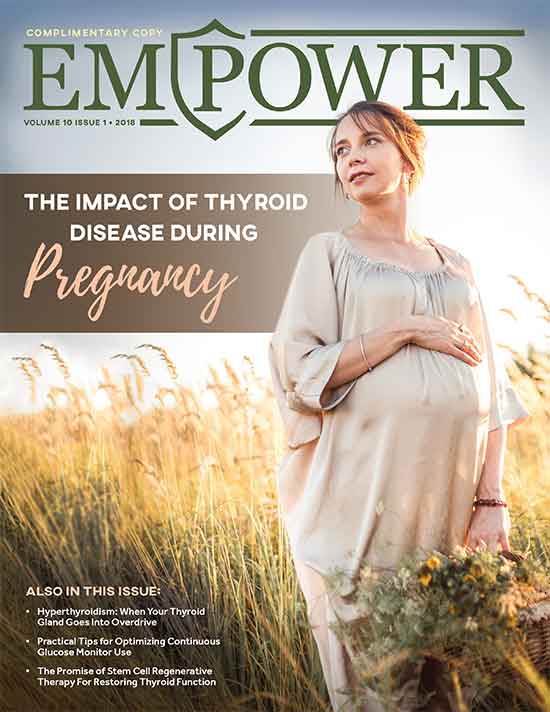
4 issues of EmPower® Magazine were produced in 2017 and featured a total of 40 articles, with content covering the full spectrum of endocrine diseases states, from diabetes, bone health and obesity treatment to optimized thyroid disease care, transgender medicine and PCOS.
empoweryourhealth.org By the Numbers:
- 421,191: Number of website visitors in 2017, of which 89% were new visitors
- 482,233: Visitors who engaged in sessions (visits) on the site
- 582,559: Page views to the website
- 22%: Percent of website visitors spent more time on the website compared to prior years
thyroid awareness.com By the Numbers:
- 194,536: Number of website visitors in 2017
- 234,635: Page views to the website
- 44%: Percent increase in the average duration of visits

Be Prepared
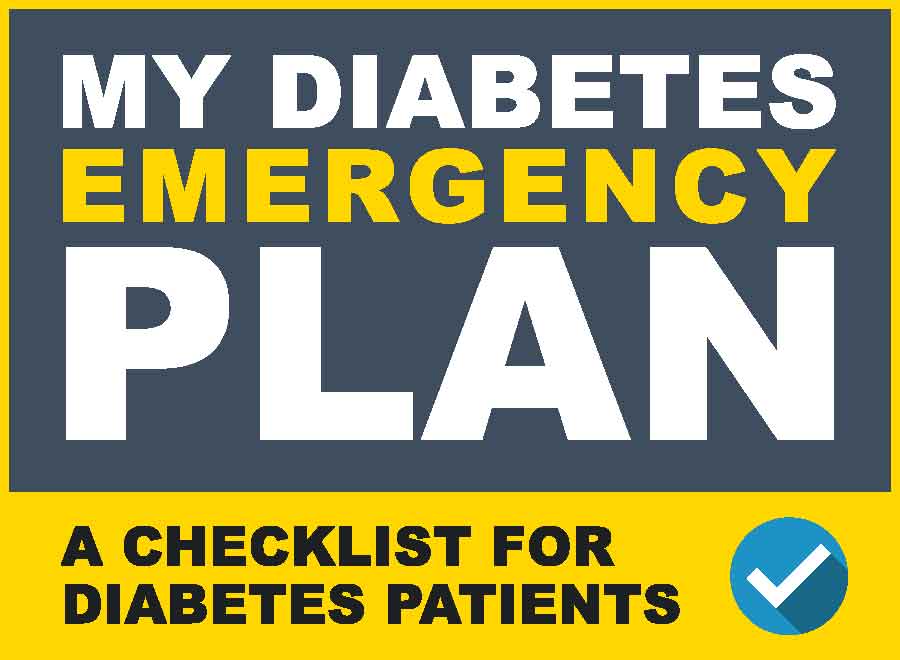
The devastation following Hurricane Katrina in New Orleans in 2005 was the impetus for developing the My Diabetes Emergency Plan (MDEP) – a checklist of items to prompt people, particularly those with diabetes, to prepare a kit with all their necessary medications and supplies in the event of an emergency such as flooding, fire or some other disaster that requires them to leave their homes.
130,000 printed copies of the My Diabetes Emergency Plan were distributed in 2017 to health professionals and organizations, hospitals, emergency preparedness officials, the Diabetes Emergency Relief Coalition as well as community and civic organizations.
ACE has been promoting this free, public service for 13 years. AACE staff attend and exhibit at highly targeted national events such as the Association of Diabetes Care & Education Specialists (ADCES) annual meeting, the national nurse practitioner’s annual meeting, the international emergency managers conference and others.
Plus, the dedicated website: www.MyDiabetesEmergencyPlan.com had a 122 percent increase in visits during 2017.
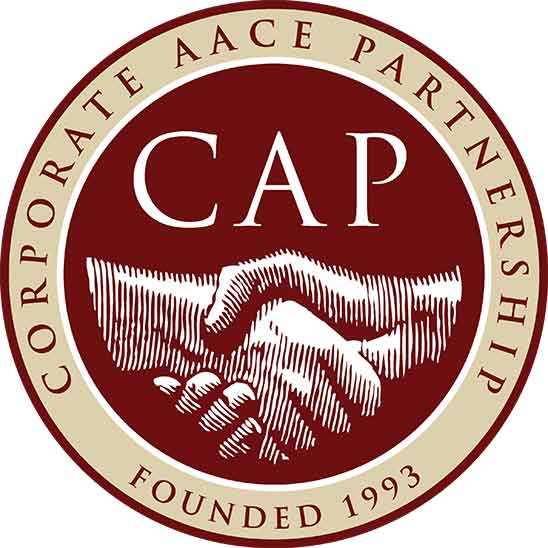
CAP - Corporate AACE Partners
The Corporate AACE Partners, or CAP,is AACE’s industry forum comprised of companies and organizations focused on areas of mutual interest in endocrine health care. CAP members often provide financial support, through grants and sponsorships of AACE’s educational programs – helping AACE continue the mission of enhancing the ability of our members to provide the highest quality of endocrine patient care.
Working Smarter at AACE
In 2017, the AACE Board approved the unprecedented spending of $2.5 million in reserve funds over five years to invest in AACE’s technology infrastructure. With implementation currently underway, the AACE Digital Strategy Portfolio includes seven infrastructure projects that will work to improve the member experience and allow AACE to deliver products and services in a format that best meets our members’ needs, as well as improve AACE’s overall efficiency and effectiveness on every level at AACE.
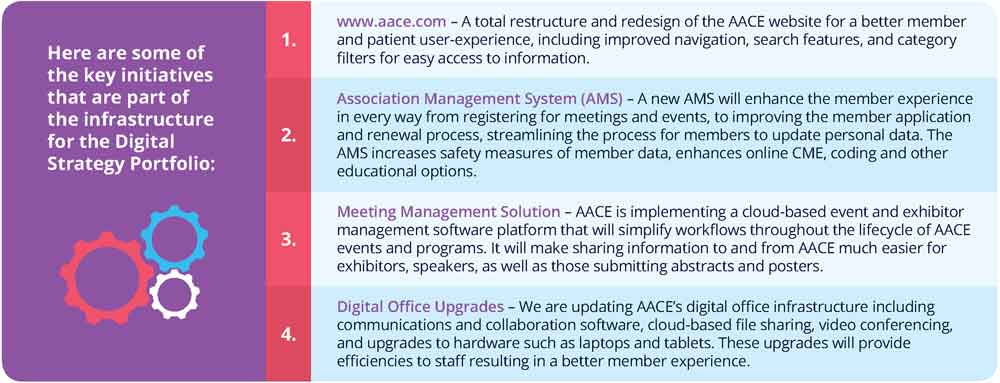
It's All in the Numbers
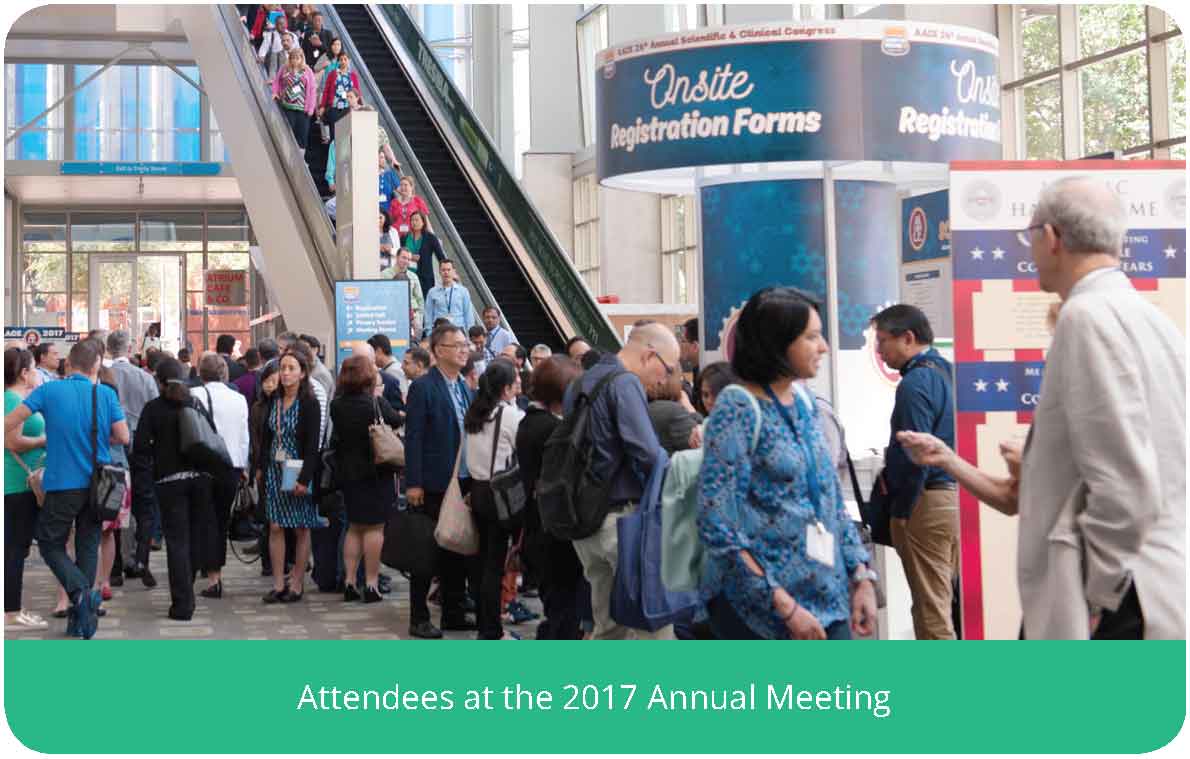
In 2017, AACE maintained its healthy financial status, with $12.7 million in revenues primarily from programs and generous corporate support. Programs included the very successful 2017 Annual Meeting, industry training, continuing medical education courses, and certification programs. Expenses total $11.5 million including meetings, printing, staff expenses, travel and contract services in support of programs and member services. In contrast, the American College of Endocrinology (ACE), AACE’s educational and charitable organization dedicated to promoting the art and science of clinical endocrinology, had a $216,000 shortfall in revenue. Expenses for AACE Corp, AACE’s for-profit subsidiary, were $616,000 greater than revenue because AACE discontinued operations of a graphics development line of business.
AACE also ended the year with a solid balance sheet, including assets of $14 million and liabilities of only $5 million, leaving $9 million in the AACE fund balance. The College (ACE) had a fund balance of $938,000, and AACE Corp had a negative equity of $362,000.
AACE continued to maintain strong reserves totaling $8.7 million on December 31, 2017. Reserves are critical for taking advantage of business growth opportunities, funding strategic operational initiatives, and protecting AACE in the event of unanticipated shortfalls in revenue. The college had $463,000 in reserves as of the end of 2017.
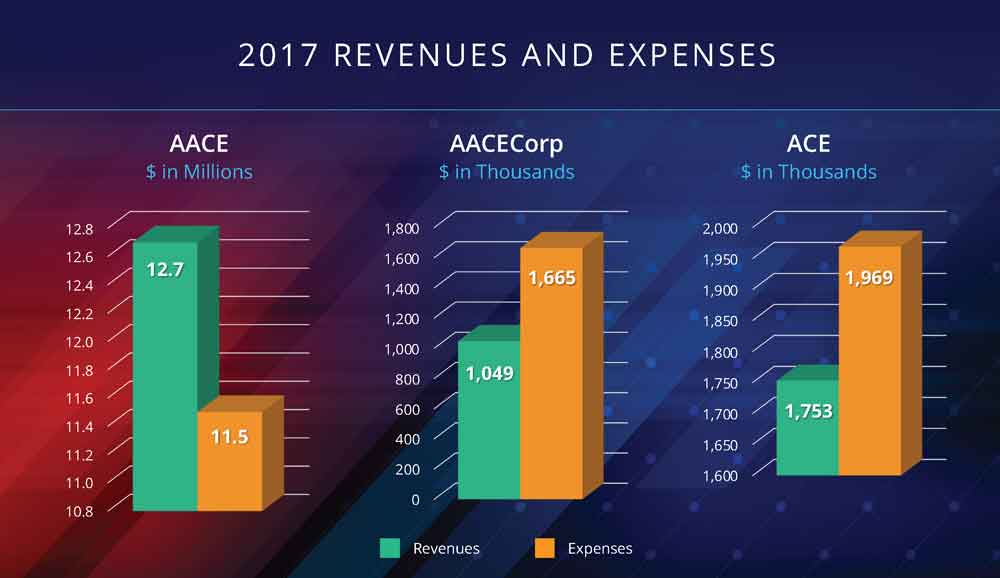


Looking Ahead
Many sustainable changes are taking place at AACE headquarters that will facilitate better operational efficiencies and coordinate best solutions throughout the association and offer a workplace culture where AACE can flourish and succeed.
One such positive change is the new Digital Strategy portfolio. Currently being implemented, this new strategy promotes best practices on every level at AACE, from integrating improved digital capabilities – including software updates, to efficient communications technologies and tools, and enhanced functionality within AACE Committees and the work they produce.
The beneficiaries of this new Digital Strategy Portfolio? AACE members!
Other positive changes include:
- A consolidated Board of Directors: The AACE Board of Directors and the ACE Board of Trustees will consolidate their board membership into near identical governing bodies, strengthening the ability of both organizations to achieve mission-driven goals by eliminating the often-confusing dual leadership structure. These changes will take effect in May after the 27th AACE Annual Scientific & Clinical Congress.
NEW - Disease State Networks
Beginning with the 2018-2019 Association year, AACE Scientific Committees will be folded and aligned into six Disease State Networks that will oversee AACE endocrine disease centers. Created to allow AACE members to serve as “pools of experts” in endocrine disease states as physician liaisons, teaching faculty, program editors for AACE educational programs, and authors/reviewers for AACE publications such as white papers and clinical practice guidelines.
AACE members may choose to be included in up to three Disease State Networks based on their areas of interests and expertise. This new process gives AACE a more tangible and inclusive means to interact with and serve all members.
The new Disease State Networks include:
- Bone and Parathyroid
- Diabetes
- Lipids and CV Health
- Nutrition and Obesity
- Pituitary, Gonad, Adrenal and Neuroendocrine
- Thyroid
Proposed AACE/ACE Governance Structure
- A new governance structure has been proposed to help AACE leadership function more strategically and efficiently in the service of achieving the AACE and ACE mission.
- The revised governance structure was developed after the Task Force to Review AACE/ACE Governance Structure conducted a comprehensive review of best practices and industry trends for corporate governance and made recommendations to reduce the board size and to merge the leadership of both AACE and ACE.
- The new structure will be implemented in a transitional fashion, scheduled for completion at the start of the 2021-22 Association year.



